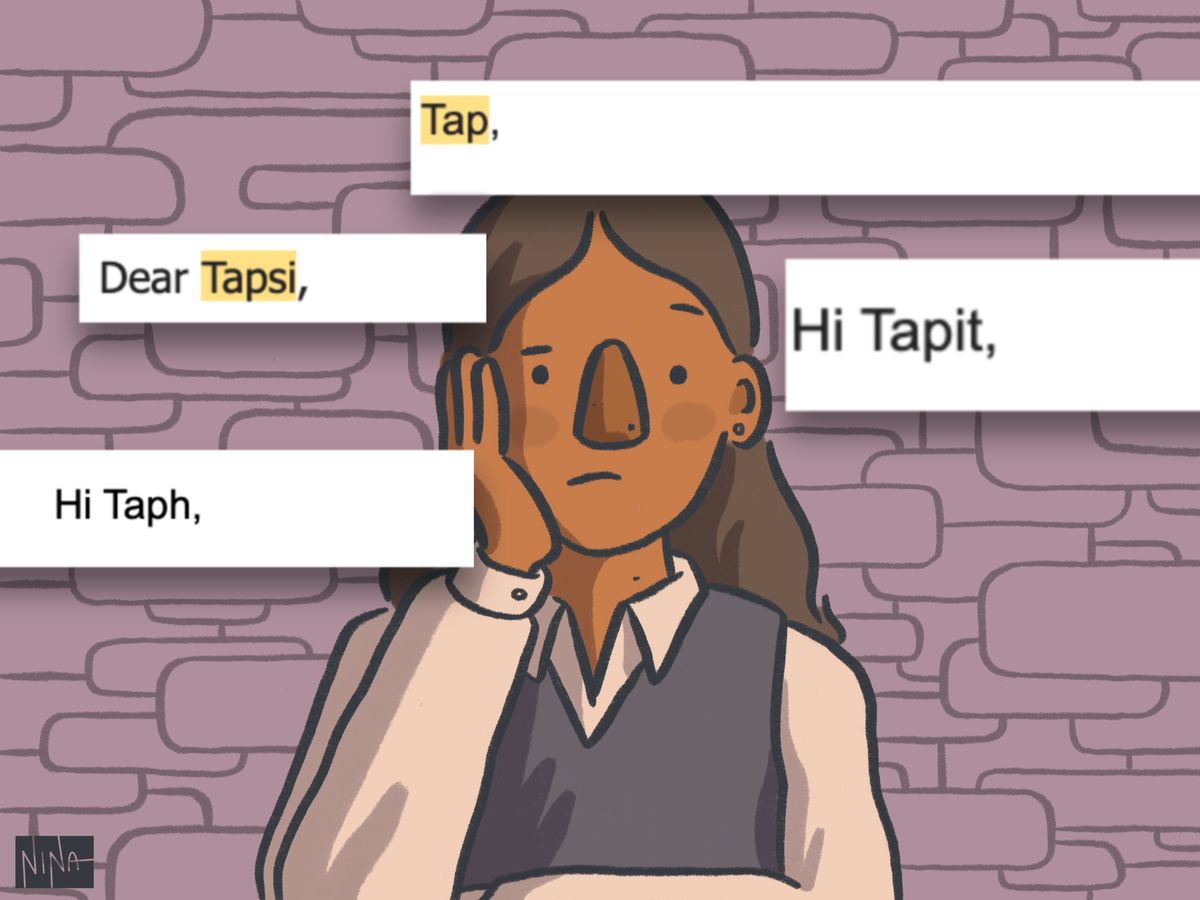Tapti Talks: Name Pronunciation Matters
In the inaugural issue of “Tapti Talks,” Managing Opinion Editor Tapti Sen ’25 reflects on the alienation of having her “foreign” name fumbled, and urges people to take pronunciation more seriously.

If I had a dollar for every time someone mispronounced my name, I’d be able to pay Amherst’s tuition 10 times over. The image above showcases just one of my many ways people at Amherst have misspelled my name, in emails where my name is clearly visible. And honestly, I’ve grown tired of it.
My name is Tapti. T-a-p-t-i, pronounced “T-ah-p-tee.” It feels, to me at least, like a relatively easy “foreign” name to pronounce: It’s short, it relates relatively well phonetically to English, and in terms of pronunciation, what you see is pretty much what you get.
Yet somehow, pronouncing my name correctly seems to be an insurmountable obstacle to so many people. I’ve been in classes where the professor has continually forgotten my name until almost two months into the semester. Other times, I’ve had to spell out my name three, four, five times until my conversation partner gets it right. And all too many times, I’ve told someone my name, and they confidently pronounce it completely differently.
This is especially exasperating because, quite frankly, it feels as though I’ve already sacrificed a part of my name to assimilate into white culture. Bangla has four “T” sounds, none of which are the same as the English “T,” and my name, written as তাপ্তী in Bangla, uses a soft “T” sound — I would describe it somewhere between the “D” sound and “T” sound in English. According to the IPA, it can be approximated by pronouncing the word “get” with your tongue on your front two teeth.
When I first came to the U.S., I was determined to pronounce my name the Bengali way, to not sacrifice my cultural identity in this foreign land. That dream died the first day I told someone my name at a coffee store and watched them write down “Dabti” on my cup. I realized that I had to pronounce my name “the American way” in order for people to even get close to a resemblance of the actual word, and resigned myself to that fact. I accepted the pronunciation variations that came with it: people saying “Tapti” as in in the phrase “tap water” or “Topti” or even “Tap-tie” (the last one was a bit too egregious, even for me).
All of this is just to say, it feels like I have already sacrificed so much of myself in the Americanized way I’ve learned to pronounce my name for English speakers. Your name is an undeniably major facet of your cultural identity, and my name, in particular, means a lot to me: I was named for my deceased aunt, whose name, Tapati meant “daughter of the sun” in Bangla. In the Indian subcontinent, names can allow you to pinpoint exactly where a person’s from — my name, for instance, is specifically a Bengali Hindu name, because my parents prioritized giving me a Bengali name rather than some “generally South Asian” one.
To have people mispell and mispronounce my name even after assimilating is a slap in the face: It feels deeply dehumanizing. Keep in mind, this is coming from someone who has an East Coast American accent — I can’t even imagine how much more intense the struggle must be for my fellow international students who don’t.
Why is it that white people can say names like Dostoyevsky and Tchaikovsky, but Tapti trips them up? Put simply, it’s racism. And I’m not saying that the mistake itself is racist — obviously, until you hear me pronounce my name, you won’t know how to pronounce it. But if I’ve told you my name, pronounced, “T-ah-p-tee” (“a” pronounced as in father) and you repeat back to me, “T-æ-p-tee” (“æ” like the “a” in “cat”), it shows me that you don’t care about how I pronounce my name. Same goes for misspellings in emails, which feel particularly egregious considering that my name is right there at the top of the screen in my email address.
Many POC and immigrants can understand the struggle of feeling disempowered to speak up and correct people. This is especially true when it comes to professors, even knowing that you wouldn’t actually face academic consequences. As a result, your very name becomes a concession to whiteness.
I have been lucky enough to be surrounded by friends and mentors who have encouraged my urge to correct people when they mispronounced my name — to ignore the burning internal embarrassment I felt when my teacher apologized for pronouncing my name, as if it were my fault for making a mountain out of a molehill. Before coming to Amherst, I convinced myself that I would maintain this habit of firmly correcting people when they mispronounced my name.
To tell you the truth, I haven’t. I still laugh off mispronunciations, brush off people’s apologies — at every moment, it just feels easier than making a scene. I’m trying to work on it though — because how will people actually learn to be better, unless you hold them accountable? One way I try to justify it to myself is to remember that every time I correct someone, it encourages them to think twice and ask before pronouncing a future name.
In a sense, I’m writing this article as a promise to myself — to stop brushing off these microaggressions and advocate for myself. And to my fellow students with foreign, unpronounceable, difficult names — I encourage you to do the same.




Comments ()